- Home
- Eoin Colfer
Airman Page 5
Airman Read online
Page 5
Victor Vigny sealed the pot, thinking about his answer. ‘I fully expect, Conor Broekhart, that between the two of us, we will learn to fly, and when that day comes, when we reveal our wondrous machine, someone will come to steal it from us. It has happened to me before. I built a glider from willow and silk: beautiful. She made the air sing when she passed. I flew a monkey over a hundred feet. For six weeks I was the toast of the fair. Tent full every night.’
Conor could see the glider in his mind. A monkey. Fabulous.
‘What happened?’
‘There was a Russian knife thrower. He came around to my wagon one night, with half a dozen friends. They burned my glider to ashes, and gave me a few licks to send me on my way. Threatened, you see, by progress. When the choices are a flying monkey or a knife thrower, who would pick the knife thrower?’
‘The knife thrower’s mother perhaps.’
Victor ran his fingers through his black hair to ensure it was appropriately erect. ‘Maybe, funny jeune homme. But then again, the females love a nice monkey. Many’s the mother would ignore her own kin for the chance to gawk at an airborne simian. The point being that, when the knife throwers come, you must be prepared.’
Conor thought about Marshall Bonvilain’s visit.
Let us hope you don’t give away all of that wondrous luck, young Broekhart. You might be needing it.
‘Where do we start?’ he asked.
Victor plucked a slim blade from the rack. ‘We start at the heart of swordplay,’ he said, slicing the air till it whistled. ‘With the foil.’
And so work began.
In later, darker times, when Conor Broekhart, alone and disheartened, remembered the life that was his, the handful of years with Victor Vigny always stood out as the happiest.
They studied martial arts, pugilism and weapons.
‘The first true fencing master to leave us an actual method of arms was Achille Marozzo,’ Victor told his pupil. ‘His Opera Nova is now your bible. Read it until it becomes a part of you. When that one is ragged, then we move back in time to Filippo Vadi.’
They spent hours on training mats putting the masters’ theories into practice.
‘First you learn to hold a sword. Think of it as a conductor’s baton. Used properly, there is not an untrained man in the world who can stand against you.’
With buttoned swords, Conor learned to thrust, parry, feint, double and riposte. He lost pints of liquid each morning in sweat, then replaced them with a jug of Victor’s foul-tasting Oriental tea.
His first weapon was a short foil, but as his wrists grew stronger he progressed to épée, sabre and rapier. Victor sawed the cast off Conor’s leg a month early, but forced him to wear a soaked bandage instead that turned his leg yellow, along with all his bed linen.
‘More circus tricks?’ Conor had asked.
‘No,’ replied the Frenchman. ‘An American friend of mine is a miracle worker with poultices and pots. Actually Nick has sent for him. I will tell you more when he has finished his work.’ And would say no more on the subject.
Victor had little time for anything heavier than a cutlass.
‘No broadsword, unless you plan to go on a crusade, and even then look what happened to the crusaders. While they were hefting their broadswords, Saladin was sticking his scimitar into their armpits.’
The Frenchman introduced Conor to escapology.
‘Scientists are the enemies of tradition,’ he said, dumping a box of assorted handcuffs on the table. ‘And tradition owns all the prisons.’
And so, more hours were spent picking locks and chewing knots. Conor found the t’ai chi most valuable when he was tied to a chair with a tantalizing apple shining at him from the table. He was now able to reach parts of his own body that previously he could not have located with a backscratcher and mirror.
Victor was a great believer in the right man for the job.
‘You need to talk to your father about guns,’ he told Conor. ‘Nick tells me that Declan Broekhart is the finest shot he has ever seen, and we spent a summer with Wild Bill Hickok in Abilene, so that’s high praise.’
Declan was delighted to help with his son’s education, and began taking Conor on Wall patrol, and down to the shooting range with a duffel bag of arms. He shot Colts, Remingtons, Vetterli-Vitalis, Spencers, Winchesters and a dozen other models. Conor was a quick study, and a natural marksman.
‘For your fourteenth birthday you shall have your own Sharps,’ his father promised him. ‘By then we should know what would suit your shoulder. I would give you one for your next, but your mother says ten is too young.’
The only weapon Victor did give Conor a few pointers on was his prized Colt Peacemaker, which Wild Bill himself had given him.
‘He invited me to come to Deadwood with him,’ he told Conor. ‘But it was not the right career choice for an aeronaut. Prospectors tend to shoot down balloons. Also I am too handsome for a prospecting town.’
All of these physical lessons were fine, but what Conor really yearned for was a mental challenge. Victor had promised him that they would build a flying machine, and the Frenchman did not disappoint. The ability to defend oneself was a necessity, but the race for flight was an obsession.
‘And it is a race, jeune homme,’ he told Conor, one morning as they stretched silk over a balsa wing frame. The wood had been part of a special shipment from Peru. ‘Many of the world’s greatest inventors and adventurers have turned their attention to this problem. Man will fly; it is inevitable. More than twenty years ago, Cayley’s triplane glider carried a passenger. Wenham and Browning have built a wind tunnel to study drag. Alphonse Pénaud was so certain of his designs that he drew up plans for retractable landing gear. Retractable! The race is on, Conor, make no mistake, and we must be first past the finishing line. Fortunately, the king supports our efforts, so we will not want for funds. Nicholas knows what the power of flight would mean to the Saltees. The islands would no longer be cut off from the world. Diamonds could be transported without threat from bandits. Medicines could be flown in from Europe. Flown in, Conor.’
Conor did think about this. He thought of nothing else. Any free minutes he had were taken up with sketching plans or building models. He forgot all about pirate games and insect eating.
Sometimes his father despaired. ‘Wouldn’t you like to make a friend? Perhaps play in the mud, get yourself dirty?’
But Conor’s mother was delighted that their son had inherited her own love of science. ‘Our boy is a scientist, Declan,’ she would say as she helped him to cover a wing, or carve a propeller. ‘The race for flight will hardly be won in the mud.’
Conor made a lampshade for the light in his room. A paper screen painstakingly decorated with depictions of da Vinci’s flapping-wing device, a Montgolfier balloon and Kaufman’s theoretical flying steam engine. Heat from the bulb rotated the shade at night, and Conor would lie in bed watching projections of these fabulous machines drift across his ceiling.
One day, he would think dreamily. One day.
CHAPTER 3: ISABELLA
Conor was fourteen by the time the teacher and pupil were convinced that manned flight was within their grasp. They had built a hundred models, and several life-size gliders, all of which had ended up stamped to pieces and piled on to the bonfire. Their efforts fuelled not only the fire but the island tavern conversation. There was general agreement that the Frenchman was a lunatic, and it seemed as though the Broekhart boy was going the same way. Still, it was a nice diversion of an evening to go watch a grown man jump off a high wall flapping his paper wings. And still the king footed the bill. Bringing in experimental engines from Germany, special wood from South America.
Magic wood, sniggered the tavern wits. Brimmin’ with fairy dust.
Not that the Saltee islanders complained overmuch about how Good King Nick spent his diamonds. Even if he wasted the odd pouch on a French birdman, life on the Saltees was better than it had been for generations. There was work for
all who wanted it. And schooling too, with scholarships to Dublin and London for the bright sparks who didn’t fancy working for a living. The infirmary was well stocked with instruments to poke and prod at a person’s organs. If you can scream, then yer alive, as the saying goes. The sewage pipes were working, carrying all the waste out to sea, which meant sickness was down. Rats were a thing of the past, on Great Saltee at least, and Bonvilain’s Holy Cross Knights were held on a tighter leash. There was no more of the random beating or imprisonment without trial that the marshall, God bless him, was so fond of. There were grants available for home improvements, and plans for telephone wires between Great Saltee, Little Saltee and even mainland Ireland. So no one was too upset if the king wished to indulge himself in a little scientific tomfoolery. It wasn’t as if the Frenchman was ever going to fly. A man in a bird suit is still a man.
Weight and wingspan were Conor and Victor’s main problems. How can something float on air if it is heavier than air? By forcing air over the wings quickly enough to generate lift, which negates the force of gravity. To generate lift you need big wings, which are heavy. If you use small wings, they must be flapped with a machine, which is heavy. Every solution presents a dozen problems.
In spite of more than three years of failures, Victor believed their method was correct.
‘We must learn control, before we fly with an engine. Gliding is the first step. Lilienthal is our model.’
The German aviator Otto Lilienthal had flown over twenty-five yards in his glider, the Derwitzer. He was Victor and Conor’s latest hero.
La Brosse never lost hope for more than five minutes. These minutes were usually spent stamping on the latest failed prototype. After that, it was back to the schoolroom and more plans.
Finally, Conor built a model that his teacher approved of. The student held his breath, while the master studied his work.
‘You know that this can never fly.’
‘Of course,’ said Conor. ‘The airman is an essential part of the ship. His movement steers it. He pushes the horizontal rudder left, the ship banks right.’
‘So we can’t test your model.’
‘No. Not unless you know an extremely intelligent monkey.’
Victor smiled. ‘I seem to remember talking about flying monkeys once before. At any rate, monkeys are intelligent enough stay on the earth, where they belong.’
‘What does that make us?’ wondered Conor.
Victor picked up the model, swishing it through the air, feeling the craft’s urge to fly. ‘It makes us visionaries, jeune homme. A monkey glances up and sees a banana, and that’s as far as he looks. A visionary looks up and sees the moon.’
Conor smirked. ‘Which resembles a big banana.’
‘Oho!’ said Victor. ‘You would mock me? Your teacher? For such impudence you must pay.’
The Frenchman tossed the model on to a cushion and made a run for the sword rack. Conor was there before him, drawing out his favourite foil, which also happened to be Victor’s favourite.
‘Oh, black card, monsieur,’ said Victor, selecting a slightly shorter épée for himself. ‘Taking a man’s blade. How long will you hold on to it, I wonder.’
Conor backed over to the training mat, never taking his eyes from his teacher.
‘En garde!’ shouted Victor, and attacked.
In the early years, when the sport was new to Conor, the Frenchman would call instructions as they fenced.
Thrust, parry, riposte. Footwork. Move your feet, you lead-footed islander. Again, here comes my thrust, so parry. Feet, Conor, feet.
No instructions any more. Now the Frenchman struggled to stay in the fight. There were no pulled thrusts or forgiving slaps with the side of a blade. This was as war.
They battled the length and breath of the chamber, even moving out to the balcony.
He is a veritable devil, thought Victor. Not a bead of sweat on his brow. Only fourteen and already he outstrips me. But the old dog has a few tricks in him yet.
‘That is the best model you have built,’ panted Victor. Riposte and counter riposte.
Conor did not reply. Never lose concentration. If your opponent makes jokes about your mother, bat them aside as you would a clumsy lunge. Insults will only make you bleed if you allow them into your heart.
‘I think you should name this one,’ commented the Frenchman. Parry on the foible, backwards glide and riposte.
Victor’s swipe knocked a bonsai tree from his terrace; below a donkey snorted his complaint.
Victor is desperate, thought Conor. I have him. Finally. He leaped from his leading foot, attempting a fleche attack, which the Frenchman barely managed to parry.
Victor fell back on his left foot, but kept the tip of his blade centred.
‘I think you should call her the Isabella,’ he said.
The name distracted Conor for barely a second, but this was ample time for Victor to breach his defence. The teacher quickly dropped low, thrusting his sword upwards for an easy passata-sotto. Had not the blades been buttoned, Conor’s heart would have been pierced from below the ribs.
‘Touché,’ said Victor gratefully, resting for a moment on one knee.
Groaning, he hoisted himself erect then returned to the cool shade of his chamber.
Conor followed dully, moments later sliding the foil into its leather sleeve on the rail.
‘Why would you say that?’ he asked quietly.
Victor shrugged. ‘Does it matter? You dropped your guard. Our friend, the flying monkey, could have defeated you.’
Conor did not appreciate the humour. If anything he seemed irritated by it.
‘It was a low trick, Victor.’
‘I am still alive, so it was a good trick. You, on the other hand, have a ruptured heart.’
Conor retrieved his model from its nesting place, plucking lint from the tail.
‘Oh, don’t sulk, please,’ begged Victor, with much melodrama. ‘You are allowed to love a princess. It is every young man’s duty to fall head over heels with a princess. You are lucky enough to actually have one to hand.’
‘Love… a princess,’ spluttered Conor. ‘What? I really don’t know…’
Victor poured himself a glass of water. ‘What an effective denial, jeune homme. But don’t feel bad; I regularly reduce people to unintelligible stammers. It’s a Gallic gift. The Italians have it also.’
His student was so nonplussed that eventually the Frenchman showed some mercy.
‘I am sorry, Conor jeune homme. I knew you had the glad eye, but I didn’t realize how glad. Arrow in the heart, is it?’
Conor’s only reply was a small nod, the barest dip of his chin. He sat on the divan, straightening his model’s rudder, blowing gently on the wings.
Victor sat beside him. ‘Why, then, do you wear the expression of a man on the gallows steps? You love a princess, and she doesn’t openly despise you. Celebrate, jeune homme. Live your life. Young love is common, but that doesn’t mean it isn’t precious.’
Conor longed to talk on this subject. It was something he had been playing close to his chest for quite a while now. If it had not been for the gliders, he would have gone insane thinking about it.
Victor read his pupil’s mood and kept silent. He noticed, not for the first time, that Conor was more man than boy now physically. He was tall for his age and strong, his countenance was generally serious and his co-ordination was excellent thanks to the fencing. Combined, these traits gave him the appearance of an older youth. Emotionally, though, Conor was very much a boy. He was a well of feelings, full to the brim, ready to spill over.
‘Isabella is my oldest friend,’ Conor began slowly. ‘I have only three friends my own age. And she is the oldest. Mother says I met her before I was even a week old.’
‘That’s young, vraiment,’ said Victor. ‘I remember the hour of your birth well. We all had a lucky escape.’
‘Have you seen the photograph? From the French newspaper. I look like an old man se
arching for his teeth.’
‘I hate to be the bearer of bad news, jeune homme, but your looks have not improved much.’
The banter relaxed Conor and he continued to air thoughts that he had never shared before. ‘I don’t know if she is beautiful or not – I suppose she is. I like her face, that’s all I know. Sometimes I don’t need to see her; I just hear her behind me and I forget every thought in my head. For God’s sake, Victor, I am fourteen now, not twelve. I have no time for babbling foolishness.’
‘Don’t be so hasty,’ said Victor. ‘There’s always time for babbling.’
‘It happened at her last birthday. So, I gave her a present, as usual. And when she unwrapped it, I could see she was disappointed. She had hoped for something different.’
‘What did you give the princess? I don’t recall.’
‘A spring-loaded glider. You remember? The single-wing design.’
‘Ah, yes. Just what every princess hopes for.’
Conor was desolate. ‘I know. She hated it. No doubt she flew it straight into Saint George’s Channel. I began to think about it. About Isabella. And what could be wrong. I realized that a glider was not a good present for a young lady. Isabella has become a young lady, and I cannot stop thinking about her.’
Victor stretched until his shoulders cracked. ‘You are lucky, jeune homme, to have me here this day. For I am an expert in all areas of instruction, including the women folk.’
Conor was doubtful. ‘Which explains why you are a bachelor in his forties.’
‘I choose to be a bachelor,’ said the Frenchman, wagging a finger. ‘There are plenty of ladies who would gladly tether Victor Vigny to their gatepost given the chance. If I had a drop of champagne for every heart I’ve broken, I would have had a full magnum before now.’
‘Can you, then, offer any sincere advice with no mention of a flying monkey?’
‘Very well, Conor Broekhart. Listen and be amazed.’ Victor leaned forward, elbows on knees as though about to present a great academic treatise. ‘The reason, I suspect, why Isabella was disappointed with the glider was that she expected something special.’

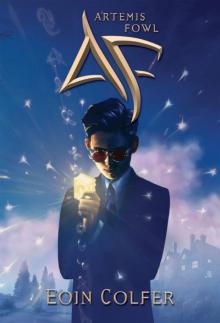 Artemis Fowl
Artemis Fowl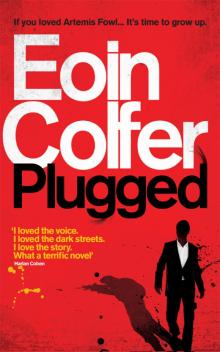 Plugged
Plugged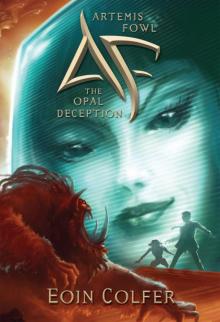 The Opal Deception
The Opal Deception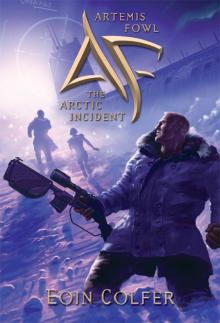 The Arctic Incident
The Arctic Incident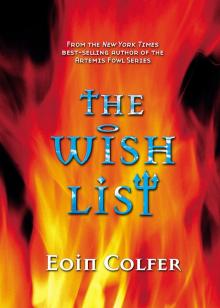 The Wish List
The Wish List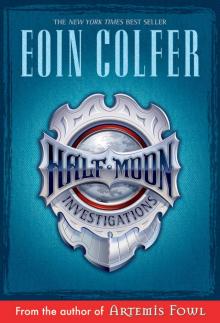 Novel - Half Moon Investigations
Novel - Half Moon Investigations The Supernaturalist
The Supernaturalist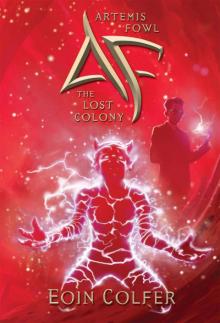 The Lost Colony
The Lost Colony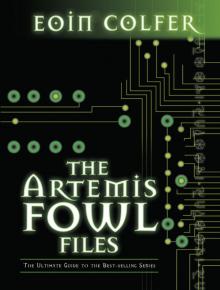 The Artemis Fowl Files
The Artemis Fowl Files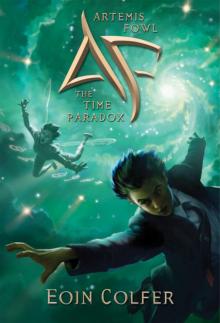 The Time Paradox
The Time Paradox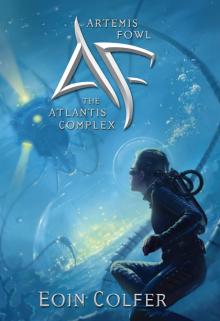 The Atlantis Complex
The Atlantis Complex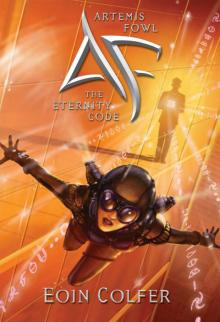 The Eternity Code
The Eternity Code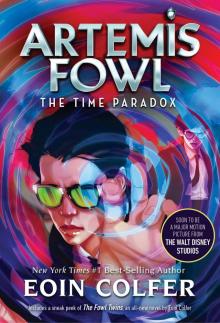 The Time Paradox (Disney)
The Time Paradox (Disney)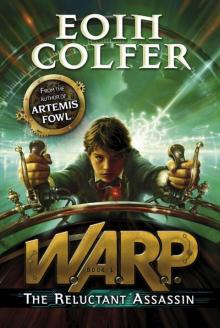 The Reluctant Assassin
The Reluctant Assassin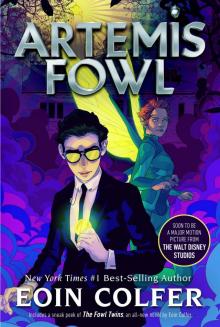 Artemis Fowl (Disney)
Artemis Fowl (Disney)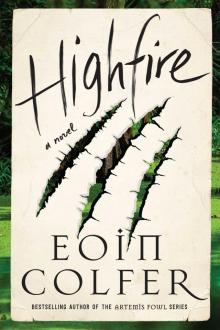 Highfire
Highfire The Last Guardian
The Last Guardian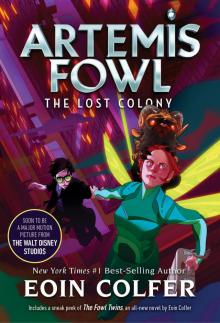 The Lost Colony (Disney)
The Lost Colony (Disney)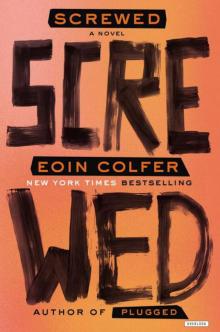 Screwed: A Novel
Screwed: A Novel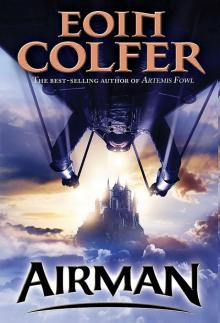 Novel - Airman
Novel - Airman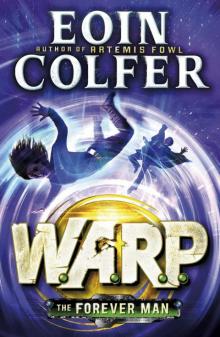 The Forever Man
The Forever Man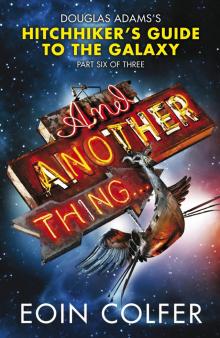 And Another Thing...
And Another Thing...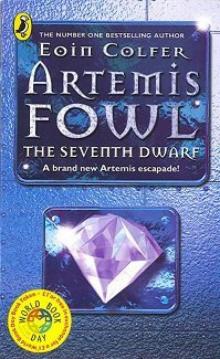 The Seventh Dwarf
The Seventh Dwarf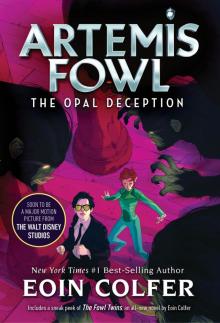 The Opal Deception (Disney)
The Opal Deception (Disney)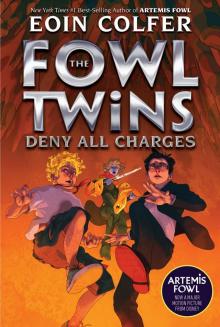 The Fowl Twins Deny All Charges
The Fowl Twins Deny All Charges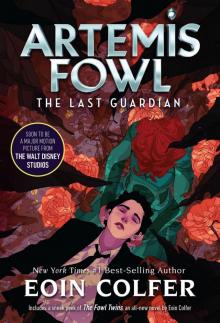 The Last Guardian (Disney)
The Last Guardian (Disney)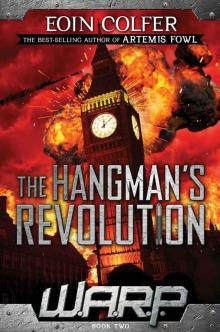 The Hangman's Revolution
The Hangman's Revolution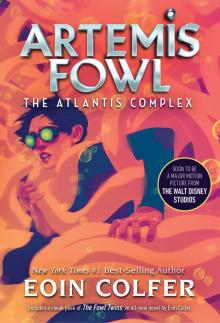 The Atlantis Complex (Disney)
The Atlantis Complex (Disney)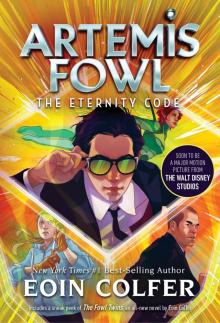 The Eternity Code (Disney)
The Eternity Code (Disney)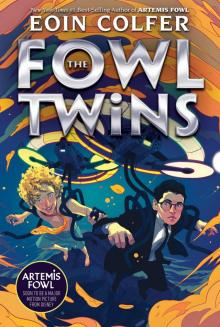 The Fowl Twins
The Fowl Twins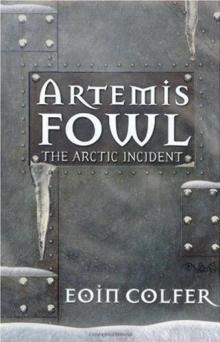 Artemis Fowl. The Arctic Incident af-2
Artemis Fowl. The Arctic Incident af-2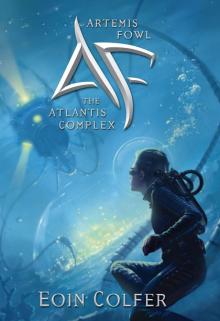 Artemis Fowl and the Atlantis Complex af-7
Artemis Fowl and the Atlantis Complex af-7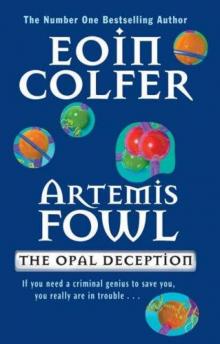 Artemis Fowl. The Opal Deception af-4
Artemis Fowl. The Opal Deception af-4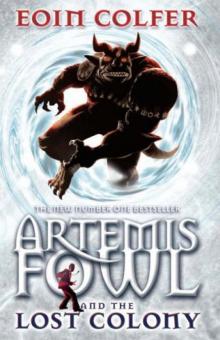 Artemis Fowl. The Lost Colony af-5
Artemis Fowl. The Lost Colony af-5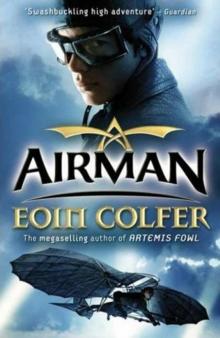 Airman
Airman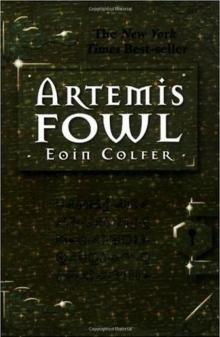 Artemis Fowl af-1
Artemis Fowl af-1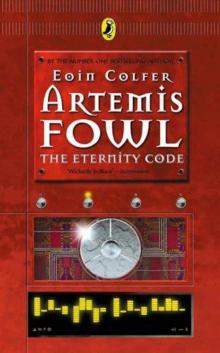 Artemis Fowl: The Eternity Code af-3
Artemis Fowl: The Eternity Code af-3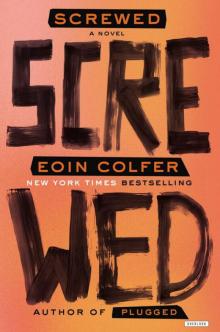 Screwed dm-2
Screwed dm-2